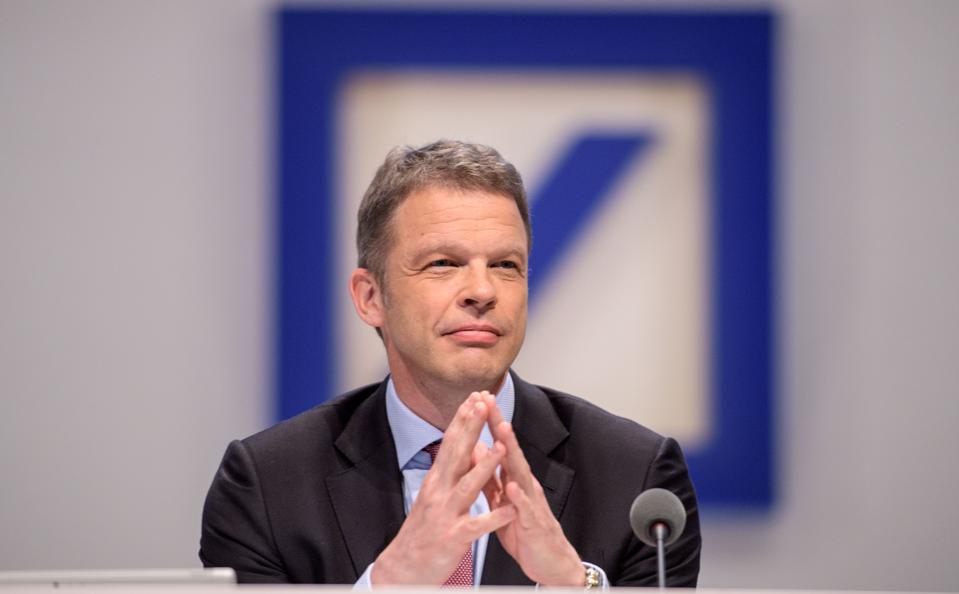
Christian Sewing, the CEO of Deutsche Bank (Photo by Thomas Lohnes/Getty Images)
Getty Images
The large, German-based financial institution, Deutsche Bank, has been the subject of an uncomfortably large number of regulatory scandals.
Historically, the Securities and Exchange Commission—along with other regulatory authorities and law enforcement agencies—have taken the approach of fining banks for their discrepancies and violative activities. The fines have ranged from multimillions to billions of dollars. Relative to the bank’s earnings, the financial penalties are basically a slap on the wrist and parking ticket.
Regulators and law enforcement haven’t made it a practice to claw back money from top executives at the companies nor do they file criminal charges against big-bank CEOs. It seems that post financial crisis, when Lehman Brothers failed and Bear Stearns and Merrill Lynch had to be bought by rival banks to stave off bankruptcy, the U.S. government feels that the banks are too big to fail and too big to jail. So, they’ve been given a free pass to keep doing what they’re doing and paying fines when they get caught. Since there hasn’t been real worries of being criminally indicted, the behavior has continued unabated.
Recommended For You
Critics of the system claim that if they would hold the CEOs, executives and management criminally responsible for their bank’s transgressions, things would change overnight. The behaviors of the chief executives, board of directors and management would quickly become compliance-centric. Things may start to change.
According to Bloomberg, Christian Sewing, the CEO of Deutsche Bank, must “annually certify that the German lender is adhering to a recent settlement in which U.S. authorities fined the firm for violating swaps reporting rules.” This change, of course, could “hold Sewing accountable for future missteps by the bank.” The report indicated that “years of compliance failures have put Deutsche Bank under the microscopes of Washington watchdogs.” The action stems from an enforcement settlement between Deutsche Bank and regulators. The bank said that it’s “committed to compliance and cooperation with U.S. regulators.”
ZeroHedge wrote about the matter, “Deutsche Bank has become known—particularly over the last 10 years—for manipulating markets (most recently in the precious metals ‘spoofing’ scandal in the U.S.) and aiding countless oligarchs and criminals in their money laundering endeavors, among other transgressions. The bank has paid more than $20 billion in fines to various regulators around the world over the last 10 years.”
Last July, on the same day that 18,000 layoffs were taking place, a photographer snapped a photo of two impeccably dressed gentlemen, who were believed to have been fired investment bankers, carrying their belongings out of the building. The photo evoked the same feeling as a preceding poignant Wall Street memory—images of sad and angry Lehman Brothers employees leaving their offices, schlepping boxes with their personal effects, as the bank was shutting down in the midst of the financial crisis. It was later detected by internet sleuths that the two men were actually tailors. They were summoned to the Deutsche Bank offices by investment bankers—who were obviously not affected by the downsizings—to fit them for custom $1,800 suits. This, in a nutshell, is the problem with Wall Street—its sheer arrogance.
This may be a game changer for Wall Street and corporate America. President Donald Trump promised during his run for the presidency in 2016 that he would get rid of regulations. He maintained that rules and regulations stand in the way of business growth. By declawing regulations, it would free the “animal spirits” of the business world and lead to economic growth and the creation of new jobs. Under his administration, enforcement actions were not as important as they were under President Barack Obama’s administration.
Historically, Democratic leadership has called for more regulations and controls—compared to the Republicans. If Biden and Harris become the respective president and vice president, it’s reasonable to believe that they’d hold Wall Street banks and their CEOs and management more accountable.
